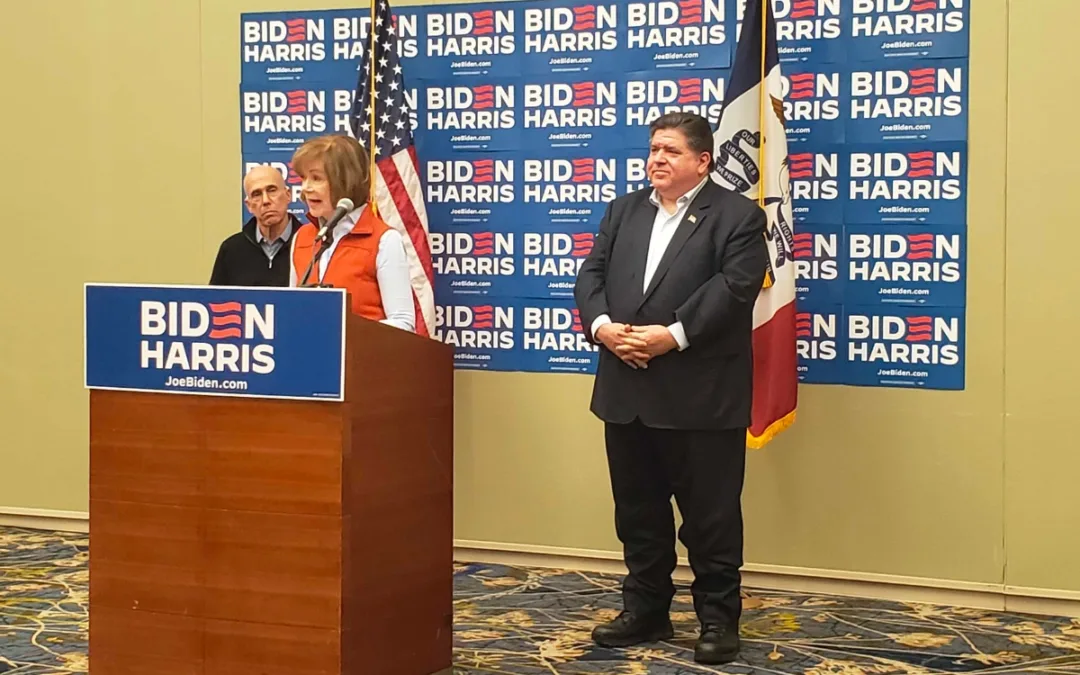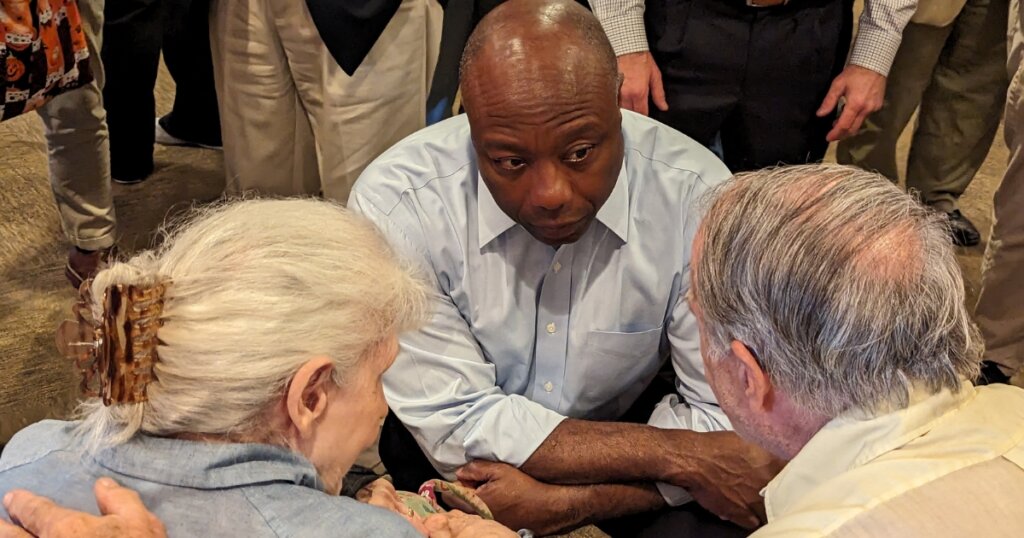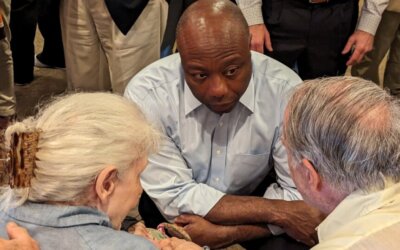
Late last week the Iowa Democratic Party released the list of members of its long-awaited caucus review commission, formed to take a look at how to improve the Democrats’ caucus process. The party says it’s part of their tradition in finding ways to better the caucus, but the scale of the effort is clearly in response to the considerable criticism laid on the IDP following the close contest on February 1st.
The first big question is just whether this commission will accomplish real changes, or if it’ll simply serve as a face-saving measure for the IDP and Andy McGuire. There’s some good names on the list (posted at the end of this article) of longtime activists who care deeply about getting the process right. It is notably missing John Deeth, whose setup of Johnson County’s caucuses and convention were one of the success stories this year. And it’s also filled with a number of allies of the current IDP leadership.
Plus the committee is notably light on Sanders backers and heavy on Clinton supporters. All Democrats are looking to improve the process, and the solutions likely won’t fall along Clinton-Sanders lines, but it would have been politically smart of the IDP to have included more Sanders folks. Those people also would have brought to the table the viewpoint of many first-time caucus-goers. If the committee only sees the process through the eyes of party regulars, they may miss out on why so many were frustrated in the first place.
The committee plans on having its first internal organization meeting on April 23. They’ll host several public input meetings around the state, with details announced later on.
They’ll have a lot to discuss. Here’s some topics Starting Line is hoping they’ll tackle.
Leadership and Competency
The biggest topic they need to address may also be the hardest for them to face: whether the party ran a competent effort in organizing the caucus. You can fix and adjust the rules all you want to improve things, but if the folks in charge of running it do a poor job, you’re still going to have major problems.
Plenty of stories seeped out from the Clinton and Sanders campaign in the months prior to the caucus about concerns that the party wasn’t ready or prepared for the coming turnout. Many precincts still didn’t have temporary chairs recruited in the weeks prior to caucus night. Sources say the campaigns warned the IDP of a much higher turnout and that the party’s predicted numbers were off, only to have it fall on deaf ears. In one Des Moines precinct the party sent only 25 registration forms in the caucus packet; 400 people ended up newly registering there.
In preparing for the caucus, the IDP made the curious judgement to hire a young staffer who’d only lived in Iowa a year and never experienced an Iowa Caucus herself to be in charge of organizing the 2016 Iowa Caucus. One wonders if that led to many odd decisions, like how many caucus packets inexplicably contained more absentee ballot requests than registration forms.
One big improvement they could make for future caucuses is realizing that the undertaking is simply too big these days to be run by a 20-something field staffer. It’s not just about organizing – there’s a lot of politics and relationship management that goes into pulling off a successful caucus that needs the guiding hand of an experienced Iowan. Next time the IDP may need to hire a major former election official of some sort to run the process.
Welcoming New Caucus-Goers
A large part of the issue at many precincts was the number of first-time caucus-goers that didn’t understand the rules. The impetus for education there always lies with the party and the volunteers, not with the new attendees, despite some people’s attempt to blame the newcomers. The whole point of the caucus is to get more people involved. There should be better instructions for precinct chairs on how to easily describe this process, including wording that describes the rules in simple layman terms, rather than the bureaucratic jargon it currently is.
More thought could also be put into how to make the party look like a welcoming place to first-time caucus-goers. The caucus and later conventions is very process-heavy and not reflective of the typical work the local party does anyway.
Why Do We Always Run Out Of Registration Forms?
2016 wasn’t the first time this has happened. Even if the campaigns hadn’t warned the IDP ahead of time about higher turnout, they should have been better prepared on this front. Seriously, how hard is it to print out lots and lots of registration forms? Yes, I know it costs extra money, but registration forms can be used by the party for plenty of other events later. You’re not wasting that much if you print too many.
Raw Vote Reporting
The IDP stood steadfast against calls to release the raw vote total after the closeness of this year’s race. The most likely result had this happened this year is that Clinton would have won the state delegate equivalents and Sanders would have won the overall total voters. Then you would have had all kind of conflict over who actually won the state.
The Sanders campaign didn’t raise this issue that much after the caucus when they easily could have, likely because they knew that was the rules both sides were playing by.
The committee will likely get criticized if they continue the practice by not reporting the raw vote, but the people complaining simply aren’t thinking the full consequences through. If you want the raw vote reported, then you also need to come up with a whole new way of allocating delegates. You simply can’t release two sets of numbers that could conflict with each other.
Perhaps the solution would be to simply do what the Republicans do and essentially hold a straw poll (that would lead to many other problems – chief among them, there would be an incentive for Democratic candidates to skip rural areas and just run up the totals in the cities, lessening the party-building aspect of the caucus). I personally prefer the current method and think this is by far not the most pressing issue anyway.
Absentee Option
Nebraska had a very interesting experience with their own absentee ballot effort. There were some hiccups, but it was by and large successful and helped allow many voters who couldn’t make their caucus still have their vote count, without taking away from the discussion and party-building aspect at the caucus locations. Implementing one in Iowa would be awfully tricky, but they should try.
Delegate Math
The basic delegate math should definitely be revisited just to see if there’s any way to make it simpler or find ways to avoid weird potential situations. Supposedly some of the coin flips were due not to a tie, but to an uncertainty in how to allocate the last delegate from a precinct when too many people left before the final count, causing neither candidate to reach the number they needed to dole out all the delegates. The simple fact is that some attendees leave, so basing the numbers off of the initial count/viability numbers can cause problems and confusion in some precincts.
Bound Delegates
One other major frustration that’s cropped up this year (and in 2008) was at county conventions as the two campaigns continued to fight over delegates. As is often noted, caucus night is simply the first step in the process – the projected count from the caucus is simply that, a projection. Numbers can change as delegates switch sides, fail to show up or realign away from a candidate who’s dropped out at county, district and state conventions.
The reasoning behind this is that it keeps people involved in the process and the party because candidates and their supporters still have a stake at later conventions.
That’s a nice idea in theory, but did it actually happen in practice this year? Just look at the Polk County convention to get your answer (and many other counties had problems too). Having to continue to fight for delegates pits Democrats against each other long after the caucus is over and led to cries of conspiracy and unfair rules at the county conventions. Many left those events less likely to to become a longtime member of their local party. Also, why are dull, confusing conventions the best way to get people involved in the party anyway?
And how is that fair at all to those who show up on caucus night, along with the campaigns that spend months, manpower and millions of dollars to get their supporters turned out, to see their choice reversed by people on down the line. Why do people have to turn out four separate times to make sure their vote gets counted? Why should these national campaigns be forced to keep sending staff back to hold onto their delegates? Iowa is lucky the Clinton campaign didn’t use her losses at county conventions in 2008 as an excuse to bypass the state entirely this time.
Bottom line, the amount of projected delegates that a candidate wins on caucus night should be the number they end up sending to the national convention. The Republicans changed this after 2012 and now have bound delegate amounts. If the party wants to maintain some excitement for the conventions, then perhaps still allow delegates for candidates who dropped out to realign – so a candidate can pick up more delegates at conventions, but not lose them.
Delegate strategy at conventions may be a fun game for some old-timer insiders, but it’s just plain stupid and undemocratic for the rest of us. It should end.
Online Pre-Registration
The IDP has already indicated they’re thinking of doing this. Doing something similar to a pre-flight check-in at an airport seems doable and should vastly cut down on lines. If they really wanted to get a lot of use out of it, the party could forward on to the campaigns who has pre-registered and who hasn’t. That would incentivize the campaigns to push their supporters to use it.
Reporting
Did that many precinct chairs actually use the much-vaunted app? Hopefully they openly discuss those numbers and percentages so the party can decide if that was a good use of funds this year and in the future.
Here’s the full list of the caucus review committe’s members:
- Chair Dave Nagle, Black Hawk County
- Evan Burger, Story County
- Scott Brennan, Polk County (Ex officio)
- Melanie Cloud Gross, Johnson County
- Sandy Dockendorff, Des Moines County
- Sue Dvorsky, Johnson County (Ex officio)
- Rep. Abby Finkenauer, Dubuque County
- Jamie Fitzgerald, Polk County
- Marcia Fulton, Union County
- Elesha Gayman, Scott County
- Dick Goodson, Polk County
- Senate Majority Leader Mike Gronstal, Pottawattamie County (Ex officio)
- Rep. Chris Hall, Woodbury County
- Congressman Dave Loebsack, Johnson County (Ex officio)
- John McCormally, Polk County
- Marcia Nichols, Polk County
- Bret Nilles, Linn County
- Jean Pardee, Clinton County
- Penny Rosfjord, Woodbury County
- Ken Sagar, Polk County
- Don Smith, Poweshiek County
- House Democratic Leader Mark Smith, Marshall County (Ex officio)
- Norm Sterzenbach, Polk County
- Marcia Thompson, Story County
- Miriam Tyson, Black Hawk County
- Christian Ucles, Polk County
by Pat Rynard
Posted 4/5/16

Original, heels or boots: Pritzker says leading Republicans are all MAGA
Illinois Gov. JB Pritzker said all three leading candidates in the Iowa GOP caucus—Donald Trump, Nikki Haley, and Ron DeSantis—represent the same...

Trump tells supporters it is worth dying to caucus for him
Former President Donald Trump continues to encourage his massive base to turn out in droves for him during Monday’s Republican caucus and told an...

Climate change protesters disrupt Ron DeSantis event
Climate protesters disrupted a Gov. Ron DeSantis campaign event in Ames on Thursday night. Three protesters were escorted out of the room at...

Evangelical leaders predict huge caucus turnout, downplay endorsements
Iowa caucus candidates have racked up big-name endorsements—including a notable last-minute flip flop—but one evangelical leader said none of that...

We went to Vivek Ramaswamy’s ‘Vektoberfest.’ Here’s what we saw
As I sat on a park bench eating a bacon-grilled cheese sandwich, drinking an Exile Ruthie straight from the tap, and chit-chatting with a few folks,...

Tim Scott says kids need more exposure to conservatism
While many Republicans across the country have spent the last few years arguing that public schools are being used to indoctrinate kids into leftist...





